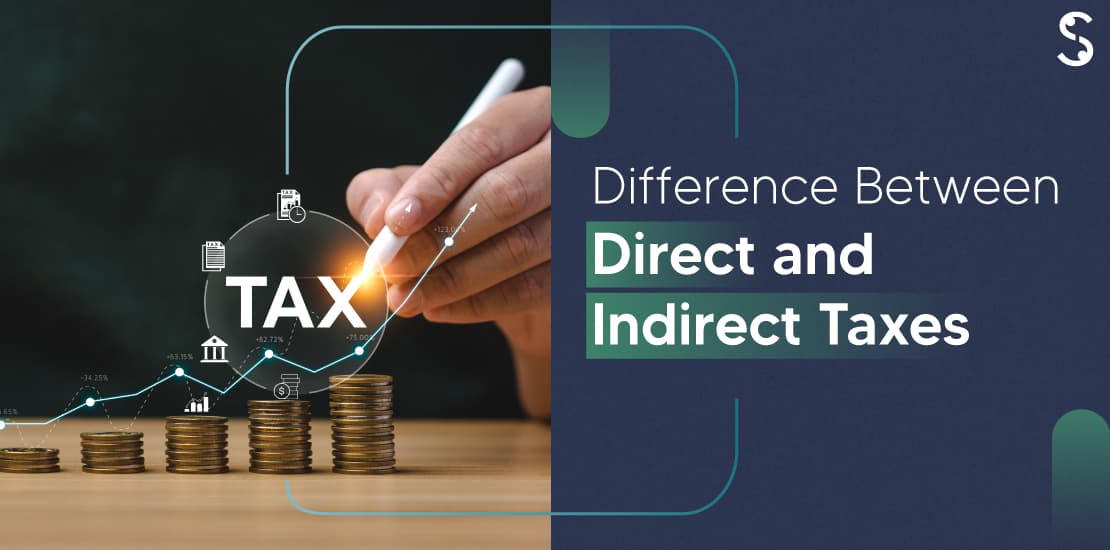Table of Contents
- Understanding Taxes
- Understanding Direct and Indirect Taxes
- Direct Tax and Indirect Tax- Differentiation
- Should Everyone Contribute to Both Direct Tax and Indirect Tax?
- Which Taxes, Direct or Indirect, Are More Vital to the Economy?
- What are the Direct Tax and Indirect Tax in the UAE?
- Tax Consultancy Services
Direct taxes are paid by individuals or businesses directly to the government, while indirect taxes are levied on goods and services and paid by consumers. It’s crucial for eligible people to comply with the country’s tax laws and pay the applicable taxes. Understanding the distinction between Direct Tax and Indirect Tax is essential for taxpayers.
Taxes serve as a significant revenue source for governments worldwide, collected in various forms such as income tax on salaries, sales tax on restaurant meals, toll fees for driving, or taxes on groceries at stores. As responsible citizens, we have a duty to fulfil our tax obligations and understand the different tax types we encounter. Broadly, taxes are categorised into Direct Taxes and Indirect Taxes. In this blog, Shuraa Tax will help clarify the differences between these two tax types.
Understanding Taxes
Taxes are compulsory financial charges or levies imposed by a government on individuals or entities to fund public expenditures and various governmental functions.
Most nations implement a tax system to finance public services, societal needs, and government operations. Taxes can be levied at a fixed percentage on personal income, or they may be progressive, increasing with higher income brackets.
Taxation is integral to a country’s economy, generating revenue for the government to invest in infrastructure, education, healthcare, public safety, and more. Additionally, taxes can shape economic behaviour by incentivising savings or investments through tax breaks and discouraging detrimental activities like smoking by imposing higher taxes on tobacco products.
In general, taxes can be categorised into two main types:
– Direct Taxes
– Indirect Taxes
Every tax is either direct or indirect. Taxation policies can vary widely between countries, making it essential for individuals and businesses to conduct thorough research, understand, and adhere to the best tax practices when earning income or running a business.
Understanding Direct and Indirect Taxes
Differentiating between direct and indirect taxes is crucial as they each have distinct economic implications and impact individuals differently. Direct taxes directly influence a taxpayer’s disposable income, influencing their spending, saving, and investment choices. In contrast, indirect taxes can alter consumer behaviour by raising the prices of certain goods or services, potentially reducing their demand.
Direct Tax
Direct taxes are levies paid directly to the taxing authority by the taxpayer. For example, income tax is directly paid to the government by the taxpayer. Direct taxes cannot be shifted to another individual or entity. In most countries, the tax authority oversees all tax-related matters.
These taxes are generally based on an individual’s income or wealth; the tax amount is determined using a progressive tax system. This means higher-income individuals pay a higher percentage of their income in taxes. Common types of direct taxes found globally include income tax, property tax, and wealth tax.
Once the tax amount is calculated, the taxpayer is responsible for paying it to the government. Payment methods can vary, including electronic transfers, checks, or credit card payments. Failure to pay the owed tax can lead to penalties, interest charges, or legal actions.
Indirect Tax
Indirect taxes are levied on the consumption of goods and services. Unlike direct taxes, these taxes are not directly based on a person’s income. Instead, the taxpayer pays the tax indirectly as part of the purchase price of goods or services. For instance, when buying a candy bar, the price includes an indirect tax like a sales tax, which the store collects and forwards to the government.
Consumers often pay indirect taxes without realising it, as they are embedded in the prices of goods and services they purchase. Common examples of indirect taxes worldwide include sales tax, value-added tax (VAT), and excise duties.
Understanding these tax types is essential for individuals and businesses to manage their finances effectively and comply with tax regulations.
Direct Tax and Indirect Tax- Differentiation
Direct tax and Indirect tax are distinguished by their method of imposition and who ultimately shoulders the economic impact of the tax. Direct taxes are imposed on individuals or businesses based on their income, profits, or assets. In contrast, indirect taxes are imposed on goods and services rather than directly on individuals or businesses. These taxes are embedded in the prices of goods or services and are ultimately borne by the end consumer.
Here’s a breakdown of the differences between direct and indirect taxes:
| S.no | Direct tax | Indirect Tax |
| 1. | Direct taxes are paid by taxpayers directly to the government, and the tax burden directly impacts the taxpayer. | The burden of indirect taxes is passed on to the consumer indirectly, as they end up paying the tax through increased prices for goods and services. |
| 2. | Examples include income tax, property tax, wealth tax, and corporate tax imposed on businesses. | Examples include VAT, GST, and central excise duty. VAT is levied on product prices, while excise tax is on manufacturing and retail. |
| 3. | Collecting direct tax, unless deducted at the source, like for salaried individuals, is complex. Tax avoidance is common for businesses, making identification and penalties challenging. | Taxes on goods and services are included in the product price, making them unavoidable. Taxes are typically listed on consumer product packaging. |
| 4. | Direct taxes help boost the economy and control inflation. | Indirect taxes boost the economy but can cause inflation. |
| 5. | Direct taxes apply to moderate to high-income individuals and businesses. | Indirect taxes impact low-income individuals more than high-income ones. |
| 6. | Direct taxes reduce income and discourage savings. Tax avoidance shifts the burden to a smaller part of society. | Indirect taxes reduce personal consumption and encourage savings. Consumers are cautious with heavily taxed products. |
| 7. | Direct taxes like income tax reduce socioeconomic inequality by funding societal welfare, benefiting everyone. Public transport is a prime example. | Indirect taxes widen the wealth gap. The rich can afford quality essentials, while the poor may miss out on certain goods. |
Should Everyone Contribute to Both Direct Tax and Indirect Tax?
Absolutely, eligible individuals and businesses should pay both types of taxes to finance public services and investments. Eligibility is determined by each country’s tax laws and income sources. Governments collect direct taxes on income and profits, and indirect taxes on goods and services. Regular tax payments are essential to avoid penalties.
Which Taxes, Direct or Indirect, Are More Vital to the Economy?
Both direct and indirect taxes contribute nearly equally to government revenue in advanced economies. They fund public services and investments and are structured to generate revenue effectively. In 2020, the International Monetary Fund (IMF) reported that direct taxes made up 50.6% of total tax revenues in advanced economies, while indirect taxes accounted for 49.4%.
What are the Direct Tax and Indirect Tax in the UAE?
In the UAE, the primary direct and indirect taxes include:
- Corporate income tax: A 9% tax on businesses will be implemented starting June 1, 2023.
- Value-added tax (VAT): On January 1, 2018, a 5% VAT was introduced on most goods and services.
- Excise tax: Tobacco and energy drinks are subject to a 50% excise tax, while carbonated drinks and alcohol are subject to a 100% excise tax.
- Customs duties: Applied to certain imported goods, with exemptions for some products.
Tax Consultancy Services
Tax consultants worldwide provide valuable insights into various direct and indirect taxes in the country, ensuring compliance with government regulations. Shuraa Tax stands out as a leading firm in the UAE, offering experienced tax consultants and agents to global clients. Our corporate tax specialists help businesses maintain tax compliance with local laws and regulations.
We also assist with tax-related tasks like registration, filing returns, and refunds to avoid penalties. Do you have questions about direct or indirect taxes? Shuraa is always ready to assist. Call us today at +971508912062 or email info@shuraatax.com.













